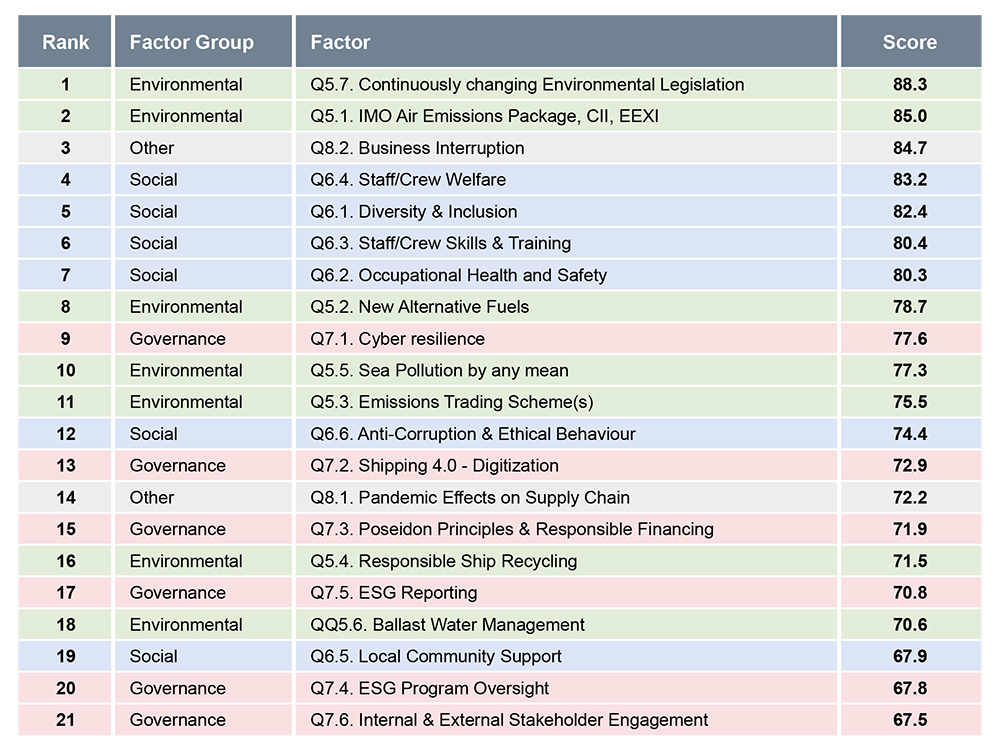Although the Environmental related issues seem to be well cared by shipping organizations to successfully achieve the green transition; Society and Governance need to be appropriately integrated into the industry’s policies. However, the industry is not giving much priority to the Governance parameter, giving ground mainly to the “E” and “S” of ESG, the SAFETY4SEA ESG Climate Survey revealed.
In particular, the SAFETY4SEA ESG Climate Survey, that took place within Q1/Q2 of 2022 with the aim to examine ESG factors and trends concerning the maritime industry, provided a picture of how shipping organizations respond to the new ESG trends and challenging requirements, by shaping their agenda. 1,183 individuals participated occupying different positions in the maritime industry.
The responses were mainly derived from ship managers and service providers, and a smaller part from Associations, Ports, Machinery and Equipment Providers, as well as Offshore personnel. Half of the participants were Senior Executives, followed by CEOs, Directors and Young Executives.
ESG top 5 critical issues for the maritime industry
According to the survey, maritime organizations have realized the need for placing the following issues at the top of their agenda:
#1 Continuously changing Environmental Legislation – 88.3% of responses
New rules and regulations are constantly put into force regarding sustainability and environmental plans. The IMO keeps making progress on a number of critical environmental issues that will impact the shipping industry’s structure. Decarbonizing the industry is a top priority especially in the EU regulations since it can be one of the most environmentally efficient ways to transport goods with lower impact to the ecosystem.
Although the Environmental related issues seem to be well cared by shipping organizations to successfully achieve the green transition; Society and Governance need to be appropriately integrated into the industry’s policies. However, the industry is not giving much priority to the Governance parameter, giving ground mainly to the “E” and “S” of ESG, the SAFETY4SEA ESG Climate Survey revealed.
In particular, the SAFETY4SEA ESG Climate Survey, that took place within Q1/Q2 of 2022 with the aim to examine ESG factors and trends concerning the maritime industry, provided a picture of how shipping organizations respond to the new ESG trends and challenging requirements, by shaping their agenda. 1,183 individuals participated occupying different positions in the maritime industry. The responses were mainly derived from ship managers and service providers, and a smaller part from Associations, Ports, Machinery and Equipment Providers, as well as Offshore personnel. Half of the participants were Senior Executives, followed by CEOs, Directors and Young Executives.
ESG top 5 critical issues for the maritime industry
According to the survey, maritime organizations have realized the need for placing the following issues at the top of their agenda:
#1 Continuously changing Environmental Legislation – 88.3% of responses
New rules and regulations are constantly put into force regarding sustainability and environmental plans. The IMO keeps making progress on a number of critical environmental issues that will impact the shipping industry’s structure. Decarbonizing the industry is a top priority especially in the EU regulations since it can be one of the most environmentally efficient ways to transport goods with lower impact to the ecosystem.
#2 IMO Air Emissions Package, CII, EEXI – 85% of responses
The IMO, acknowledging the positive impacts that the elimination of airborne emissions from ships could have on the atmosphere and human health of seafarers and coastal communities, has taken measures for energy efficiency and has strengthened emission limits due to technological innovations and implementation experience. On that note, two new measures were established, a technical one addressing the design parameters (EEXI) and an operational one regarding the actual emissions in operations (CII).
#3 Business Interruption – 84.7% of responses
According to Allianz’s Risk Barometer for 2022, Business Interruption (ΒΙ) occupies the top risk spot for shipping companies, with cyber incidents being the most feared cause of it. It is understood that BΙ has raised concerns and triggered reviews of business resilience, enhancing the top management’s willingness to work with data and improve transparency for the better understanding of the multiple factors of BI. BI risks will probably remain the focal point of discussion in the shipping industry and that is why companies need to be prepared for a widespread range of BI in the upcoming years.
#4 Staff/Crew Welfare – 83.2% of responses
Σeafarers are at the heart of world trade, thus crew wellness is at the centre of discussion, especially, now during the COVID-19 pandemic and the Ukrainian – Russian crisis. There is an excessive need for improvement in welfare and morale onboard since seafarers face unprecedented challenges. The main domains that need to be focused on by the industry seem to be addressing fatigue risk, reduced contract lengths, no crew change clauses and sufficient amount of rest hours. Life at sea has suffered a lot of changes in the last few years and, that alone, should act as a wake up call for the shipping industry.
#5 Diversity & Inclusion – 82.4% of responses
The COVID-19 pandemic has put the spotlight on the social pillar of ESG, and seems to have affected majorly women and other vulnerable groups both in the workplace and in the community in general. Nowadays, with shipping being a male-dominated industry and growing really fast, it is vital to obtain a high score in the “S” of ESG. Diversity & Inclusion in all forms are key drivers of change in shipping, an industry known for being traditional and slow to change. In order to transition to new dynamics, supportive policies are needed in addition to an official and integrated D&I plan that will challenge and reinforce the existing policies.
Key Findings
- Regarding the shipping industry’s ESG Agenda, emphasis is given in the “E” of ESG. Most participants consider environmental issues to be of major importance (up to 70% of them were voted environmental issues as very important or major). The “G” of ESG is indicated to be the least important sector of ESG for the maritime industry.
- Continuously changing Environmental Legislation seems to be the shipping industry’s top priority regarding their ESG Agenda, ranking in the first place with 88.3% while the Internal & External Stakeholder Engagement drops down to the last place of concern in ESG strategies with a percentage of 67.5%
- Regarding Social issues, shipping companies should realize the positive impacts of supporting local communities and acting cooperatively. Going through a pandemic showed how important it is to engage in community affairs and interact with society.
- In Maritime’s Governance, ESG Reporting must be reinforced since the mitigation of climate change effects currently relies on the existing “self-reporting” system. Without the right data, action and measures can not be taken.


































































